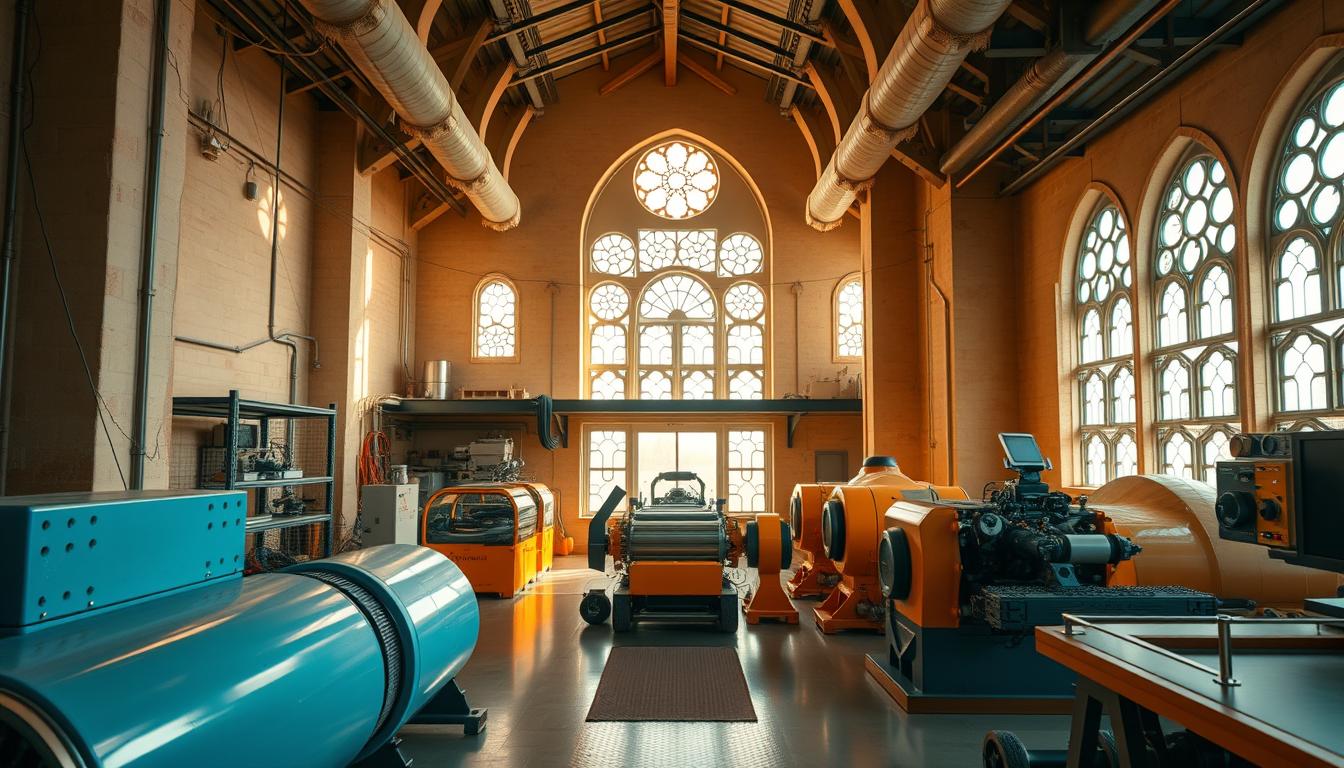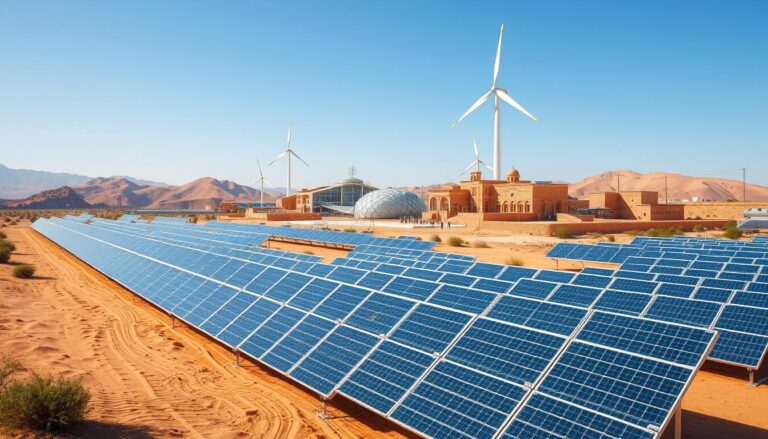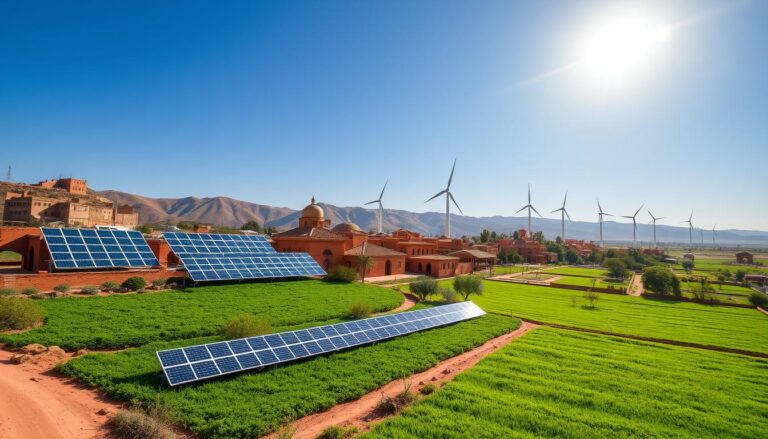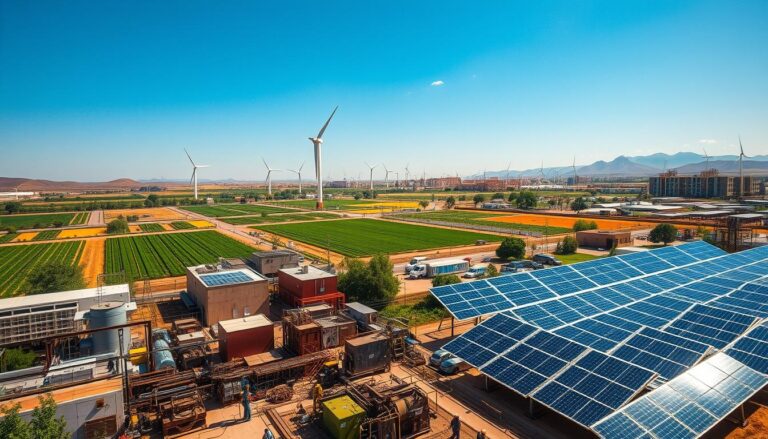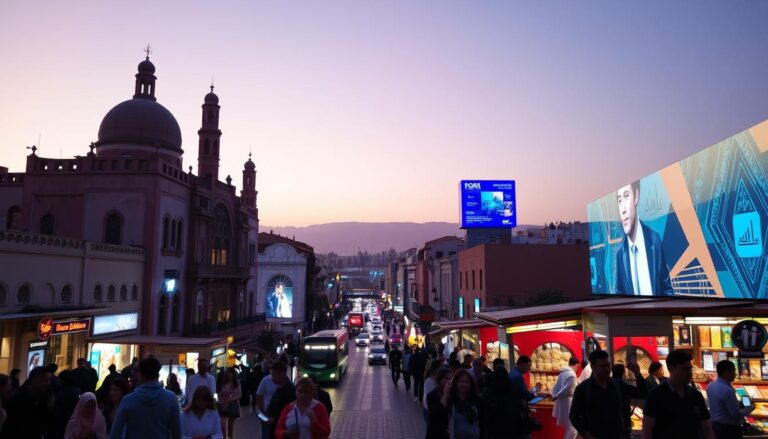How does Morocco plan to leapfrog into a digitally enhanced future while driving socio-economic development?
Recently, Morocco has seen digital transformation as key for growth. It aims to make public services digital, improve digital skills, and boost tech use in businesses. Morocco is becoming a big player in Africa’s digital scene.
With the Digital Development Agency (ADD) and a National Digital Strategy, Morocco is building a strong digital base. It’s making public services easier to access and more inclusive.
The plan is big, with goals like training 22,500 digital experts by 2027. The Ministry of National Education has also set up a Digital Lab to improve learning.
Morocco’s digital journey goes beyond education. IT, telecoms, e-commerce, and online services are set to grow. Partnerships, like between BMZ and the Moroccan Ministry, are helping move forward.
Projects like Connected Classrooms will help schools near LafargeHolcim sites over three years. Morocco wants to be among Africa’s most competitive economies by 2030.
These efforts show Morocco is ready for the future. It’s closing the digital gap and leading in innovation.
The Evolution of Digital Transformation in Morocco
The digital transformation in Morocco has grown a lot over the years. The government aims to create a national digital hub. They’ve started many projects to make Morocco more connected and competitive.
Government Initiatives
Government efforts have driven Morocco’s digital growth. Between 2014 and 2018, Morocco moved up in e-government rankings. By 2020, it was even higher, showing Morocco’s digital leadership in Africa.
The government also worked on governance and building digital skills. This has helped create a strong digital system.
Public-Private Partnerships
Partnerships between the government and private companies have been key. They’ve brought new ideas and IT solutions to public services. Projects like E-GOV and DigiTPME show how these partnerships help Morocco’s economy grow.
They focus on making services better for small businesses.
Historical Context
The digital journey in Morocco began in the late 1990s. From 1998 to 2010, the foundation for modern public services was set. The Digital Morocco Plan (2009-2013) launched 377 websites and made 547 services available online.
This increased remote access by 18%. The Maroc Digital 2020-2025 plan aimed to digitize all transactions by 2030. It also wanted to use e-signatures in public institutions.
Digital Development Agency (ADD) and Its Role
The Digital Development Agency (ADD) in Morocco is key to the country’s digital growth. It focuses on improving the digital ecosystem. ADD works on projects to boost digital skills and technology use in different areas.
These projects include E-GOV and DigiTPME. They aim to make digital services better and help small businesses and public services go digital.
Key Projects
ADD leads some of Morocco’s most important digital projects. These include:
- The E-GOV Project: It helps make public services digital. This gives citizens and businesses easy access to services online.
- DigiTPME: This project helps small and medium-sized businesses go digital. It makes their processes more efficient.
Future Goals
ADD has big plans for Morocco’s digital future. By 2030, it wants to improve digital skills and train 100,000 young people each year. The goal is to create 240,000 jobs in the digital field.
This will help the country’s economy grow and increase digital exports.
Collaborations with International Organizations
ADD works with international groups to reach its goals. These partnerships are key for using new technologies like AI and IoT. They help Morocco compete in the global digital market.
Impact of Industry 4.0 on Moroccan Manufacturing
Morocco’s manufacturing sector is changing fast, thanks to Industry 4.0. This change brings in IoT and AI, making production better and more efficient.
Adoption of IoT
The use of IoT in Morocco has been key during the COVID-19 crisis. A study with 45 Moroccan companies showed that over 50% kept or grew their sales with Industry 4.0. Digital tools helped keep production going, improved communication, and allowed for teamwork in real-time.
Artificial Intelligence Integration
AI is also changing Moroccan manufacturing. It makes processes smoother, cuts down on repetitive tasks, and helps businesses make better decisions. Companies in Morocco are also focusing on strong cybersecurity to protect against cyber threats.
The 6th European International Conference on Industrial Engineering and Operations Management in Lisbon talked about these changes. The conference, published by the IEOM Society International, shared insights on the good and bad sides of these changes. It added a lot to the conversation about Morocco’s manufacturing future.
Technology Adoption and Challenges
Morocco has made big steps in its digital journey, but it faces challenges. The country has improved its e-government services a lot. It moved from 82nd place in 2014 to 110th in 2018 and then up four more spots by 2020. But, it still struggles to use digital tools fully.
Barriers to Digital Transformation
Despite big steps forward, several barriers hold back full digital benefits. These include:
- Digital Bureaucracy: Dealing with complex digital admin tasks takes a lot of time.
- Access to Technology: Digital resources are not evenly spread, with a gap between cities and rural areas.
- Limited Digital Skills: Many people lack the digital skills needed to fully join the digital economy.
Solutions and Opportunities
Morocco is working hard to overcome these barriers. It’s focusing on better digital infrastructure, training in digital skills, and laws that help startups.
The National Digital Development Strategy 2020-2025 aims to digitize public services and partner with the private sector. These steps are key to overcoming digital barriers and achieving digital transformation.
The COVID-19 pandemic has sped up digital changes in public services. Morocco is moving towards a digital economy, and these efforts will be crucial. They will help achieve full digital transformation benefits and growth.
Public Administration and E-Government in Morocco
Morocco has made big steps in making its public services digital. It has launched many e-government programs to make services better and faster. These efforts are part of a bigger plan to improve how the government works.
Historical Milestones
Since 2005, Morocco has worked hard to improve its digital setup. Plans like “e-Morocco 2010” and “Digital Morocco 2013” set the stage for progress. They aimed to build a strong digital base, making the government more connected and efficient.
The Digital Morocco Plan (2009-2013) had big goals for Morocco’s digital growth. The creation of the Agency for Digital Development (ADD) in 2017 was a big step. It showed Morocco’s dedication to using digital solutions in government, with help from the Ministry of Economy and Finance.
Current E-Gov Initiatives
The Maroc Digital 2020-2025 plan shows Morocco’s focus on better e-government. It wants to be among the top in the MEA for digital services by 2025. Key projects like the digital registry and E-Parapheur platform show the government’s commitment to improving services and engaging citizens.
The government also started digital mail platforms as part of its reform. These platforms aim to make services better, cheaper, and more accessible. They have made government services more efficient and open.
Future Plans
Morocco plans to use studies to guide its digital future. These studies suggest ways to boost digital transformation, like encouraging innovation and improving education. Protecting data and making digital services better and more accessible are key goals.
Morocco’s e-government programs aim for a complete digital transformation. This approach will help Morocco become a leader in digital public administration in the region.
How Digitalization Strategy Enhances Competitiveness
Morocco has started a big digital plan to boost its global standing. It focuses on better digital systems, encouraging new ideas, and changing society. The government is spending 11 billion dirhams ($1.14 billion) from 2024 to 2026 to create jobs in digital fields.
This effort is to train 100,000 young people each year in digital skills. This is a big jump from the 14,000 trained in 2022. It shows Morocco’s strong commitment to digital management.
The main goal is to create 240,000 jobs in digital fields by 2030. This is expected to change society by offering new jobs and better lives. The plan also includes making 600 public services digital.
These services will be for citizens, businesses, and government agencies. The goal is to make services easier and faster for everyone. This will help make Morocco’s digital services better.
Morocco wants to move up in the UN e-Government Development Index from 90th to 50th by 2030. It plans to improve digital systems and cover 70% of the country with 5G. It also aims to connect 5.6 million homes to fiber optics.
This will help close the digital gap, especially in rural areas. It will make sure everyone has fair access to digital services.
Morocco also wants to be a top choice for offshoring and digital partnerships. It aims to start 3,000 new companies by 2030, with 1,000 by 2026. These startups will get a lot of support, with hopes of raising 7 billion dirhams.
This will make Morocco a center for digital innovation and business. It will help Morocco stay ahead in the digital world.
Automation Solutions for Moroccan Industry
Morocco is moving forward in its industrial sectors, and automation is key. It uses new technologies like robotics to boost productivity and stay competitive. This part will explore how these technologies are changing the game through Moroccan case studies.
Mechanization in Manufacturing
Mechanization means using machines to automate production. In Morocco, this has greatly improved efficiency and output across many industries. It lets businesses grow while keeping product quality high.
The textile industry is a great example. Mechanized looms and cutting machines have cut down production time and costs. This has made Morocco a big player in the global textile market.
Advanced Robotics
Robotics take automation to the next level. Moroccan companies are getting into advanced robotics for tasks that need precision and speed. Robots are used in assembly, packaging, and quality checks, reducing errors and improving standards.
In the automotive sector, robots handle welding and painting. This has made operations more efficient and lowered defect rates. It also meets international quality standards.
Case Studies
Many Moroccan manufacturing stories show how automation and robotics change things. For example:
- Automotive Manufacturing: Renault and PSA Group have used robots in Morocco. This has boosted production and cut costs.
- Textile Manufacturing: Automated cutting and sewing machines have improved production and lowered labor costs.
- Pharmaceutical Industry: Robots are used for precise packaging and labeling, meeting strict global standards.
These stories show how new technologies streamline operations and boost competitiveness globally.
Digital Innovation in Key Sectors
In recent years, Morocco has seen big growth in digital innovation. This growth is in healthcare, education, and financial services. The country is really into digital transformation, showing it through many projects and advancements.
Healthcare
The healthcare sector has changed a lot with digital innovation. Things like electronic health records, telemedicine, and mobile health apps have made healthcare better. With 93% internet use, Morocco can use digital platforms to improve patient care and cut down wait times.
For example, telemedicine has helped people in rural areas get specialist care. Before, they had to wait a long time for medical help.
Education
Education in Morocco has changed a lot with new technology. The Covid-19 pandemic made remote learning more common. Now, there are digital classrooms and e-learning tools that make learning better.
Technologies like Artificial Intelligence (AI) and Internet of Things (IoT) are making learning more fun and personal. This has made the learning environment more dynamic and tailored to each student.
Financial Services
Morocco’s financial sector is also getting digital. The World Bank gave $500 million to help with digital inclusion. This has led to more digital banking, mobile payments, and fintech startups.
These changes have made financial services more available to everyone. Digital platforms have also made transactions faster, cheaper, and more transparent. This has helped create a more inclusive financial system.
Morocco’s work in digital innovation shows its goal to be a digital leader in the MENA region. By investing in these technologies, the country is moving towards a more connected, efficient, and inclusive future.
Transformation Roadmap for SMEs
SMEs are vital for Morocco’s economy, creating jobs and driving innovation. They need a clear plan to keep up with digital changes. This plan includes support structures, training programs, and investment opportunities to improve business and digital skills.
Support Structures
Good support is key for smooth digital adoption. Morocco’s government and private sectors are working together. They aim to support digital growth, create jobs, and boost the economy.
Training Programs
Training is crucial for digital skill development in Moroccan SMEs. By 2027, they plan to train 100,000 young people in digital fields. This is a big jump from 14,000 in 2022. Workshops, online courses, and certifications will help SMEs stay ahead in the digital market.
Investment Opportunities
Getting investment is essential for business process optimization and digital growth. Morocco aims to grow 3,000 startups by 2030. They expect startup fundraising to hit 7 billion MAD. This investment will enhance SMEs’ digital abilities, create jobs, and increase exports.
IoT Integration and Its Benefits
The integration of IoT is changing Morocco’s industrial scene. It’s making smart factories and using real-time data analytics more common. These changes bring many benefits, like better efficiency and predictive maintenance.
Smart Factories
In Morocco, IoT in smart factories is becoming more popular. A survey of 160 companies showed a big interest in using IoT. Sectors like automotive, heavy industry, and food production are using IoT to improve their work.
IoT in smart factories offers many advantages. For example, NEI, a big bearing maker, digitized its factory. This allowed them to monitor and make decisions based on machine data in real time. Such changes show how IoT can make manufacturing better, increase efficiency, and cut costs.
Real-time Data Analytics
IoT also brings real-time data analytics. This tech lets companies quickly analyze lots of data. The survey showed that this is especially useful for predictive maintenance and improving operations.
Real-time data analytics gives deep insights into industrial processes. It helps spot inefficiencies and predict failures early. This way, companies can lower risks and boost productivity with real-time data analytics.
In summary, using IoT in smart factories and real-time data analytics is key for Morocco’s industrial growth. By adopting these technologies, businesses can achieve higher efficiency and innovation. This gives them a strong position in the global market.
Digital Transformation in Moroccan Industry
Morocco is working hard to become a top digital hub by 2030. The government is investing a lot and has a clear plan. The Moroccan National Digital Development Strategy 2020-2025 is key to this goal. It aims to make digital services better, improve online access, and boost digital skills.
This effort is to make Morocco’s economy very competitive in Africa. The industry will see big changes, leading to more innovation and better work processes.
During the Covid-19 pandemic, Morocco introduced new digital tools. These include vaccine passports and facial recognition systems. This shows Morocco’s commitment to leading in digital entrepreneurship.
The launch of the Moroccan National Electronic Identity Cards (CNIE) in April 2022 is a big step. Nine million people are already using it. Morocco is working with MOSIP and IDEMIA to create a strong digital ID system.
The government is teaming up with groups like the Digital Transformation Center Morocco. They are working on projects like E-GOV and DigiTPME. E-GOV aims to improve IT for government services. DigiTPME helps small businesses go digital by offering better support and services.
These projects aim to make businesses more aware of digital tools. They also want to improve work processes and digital skills. This will help make businesses more efficient.
Morocco is also using new tech like artificial intelligence and the Internet of Things (IoT). These technologies will make businesses more efficient and innovative. Morocco’s digital plan is setting the stage for future growth and success.
Conclusion
Morocco has made big steps in changing its industrial scene. It has used digital tech, worked with private companies, and planned for the future. This has brought big economic and social wins.
Industries in Morocco have seen a 25% boost in how well they work after going digital. They also saw a 28% jump in their earnings. This shows how digital changes can really help.
Even with some hurdles, like 54% of industries facing digital investment issues, things are looking up. Moroccan companies now keep more customers and spend less. This shows the value of a smart digital plan.
Studies show that companies that try different digital ways can grow their market share by 30%. This shows the importance of being flexible and creative in the digital world.
Morocco’s success also comes from tackling cultural barriers. Despite 67% of companies facing resistance, 40% say it’s key to have a culture that supports digital changes. The rise in IT innovation by 20% shows the need to keep up.
The shift to digital solutions in Morocco’s industry has made things more efficient. It also sets the stage for future growth and staying competitive.
Source Links
- Digital transformation in Morocco: Connected schools to modernize education – Resilient Digital Africa
- Digital Transformation Center Morocco | BMZ Digital.Global
- Morocco: The Impact of the Digitization of Public Services
- Digital Morocco 2030: the national digital transformation strategy
- Morocco unveils Digital 2030 Strategy – Hashgraph Association
- The adoption of Industry 4.0 in Moroccan industrial companies to overcome the crisis Covid-19
- The Role of Technology in Transforming the Moroccan B2B Market
- Vol.11.No.10.25.docx
- 223.docx
- Digital Transformation in the Moroccan Public Administration: A Case Study of Administrative Mail Digitization
- Digital Transformation in the Moroccan Public Sector: Drivers and Barriers
- INTITULE DE L’ARTICLE AU MAJUSCULE, CALIBRI 12, CENTRE, INTERLIGNE SIMPLE
- Morocco Unveils 2030 Digital Strategy
- Morocco goes digital with 2030 strategy focused on innovation, growth, and services
- The Impact of Industry 4.0 on Moroccan Manufacturing and B2B Sales
- Creating Industry 4.0 jobs in Morocco | Invest for Jobs
- The Digital Cooperation Organization
- Digital twins: development and implementation challenges within Moroccan context – Discover Applied Sciences
- Morocco goes digital with 2030 strategy focused on innovation, growth, and services
- Strategy Establishment to Support Digitalization of Moroccan SMEs
- PAPER TITLE (MAXIMUM 2 ROWS)
- Accelerating Manufacturing Digital Transformation with Industrial Connectivity and IoT – RTInsights
- Digital Transformation in Morocco
- Journal of Telecommunications and the Digital Economy
- Microsoft Word – ejbmr_1892(galley).docx

The Editorial Team is a passionate group of Morocco enthusiasts dedicated to sharing the beauty, culture, and wonders of this captivating country. With diverse backgrounds and a deep love for travel, we strive to bring you engaging and informative content that inspires your Moroccan adventures. From uncovering hidden gems and sharing local insights to exploring mouthwatering cuisine and showcasing the vibrant lifestyle, our team is committed to providing you with valuable resources and exciting stories that enhance your exploration of Morocco. Join us on this journey as we celebrate the rich heritage and unforgettable experiences that make Morocco truly special.

